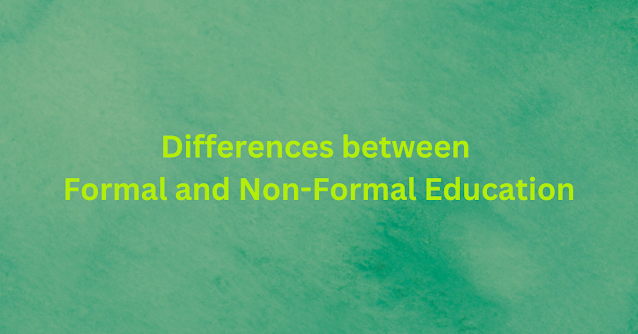Differences between Formal and Non-Formal Education
(1) Scope
Formal Education:- Limited and narrow
Non-Formal Education:- Unlimited and Vast
(2) Learner
Formal Education:- Learners who are in a position to attend full time
Non-Formal Education:- Learners who have dropped their education at school or college and who want to improve their qualification
(3) Aim
Formal Education:- Get certificates or degrees for a job or self-employment
Non-Formal Education:- Increase knowledge and skills to improve personality
(4) Place
Formal Education:- School, college, university or other training institutions
Non-Formal Education:- No specific place – factory, open space, farm, library, may also be held at school or college (Correspondence Course)
(5) Age
Formal Education:- Minimum age is prescribed
Non-Formal Education:- No age limit
(6) Grade
Formal Education:- Students are treated as group (classwise)
Non-Formal Education:- Students are not grouped except distance education
(7) Curriculum
Formal Education:- Rigid and fixed
Non-Formal Education:- No fixed except in distance education
(8) Textbooks
Formal Education:- Prescribed textbooks
Non-Formal Education:- Usually, no prescribed books
(9) Examination
Formal Education:- Held at regular intervals; writtten and oral tests consist of essay and short answer questions.
Non-Formal Education:- Normally no examination except distance education which conducts non-semester examinations
(10) Teacher
Formal Education:- Occupies an important place
Non-Formal Education:- Has limited role and plays the role of friend, philosopher and guide (part-time basis)
(11) Teaching Methods
Formal Education:- Direct teaching methods, face-to-face teaching
Non-Formal Education:- Radio, computer, television, very little face-to-face teaching
(12) Status
Formal Education:- Usually high status
Non-Formal Education:- Usually low status
(13) Period
Formal Education:- Limited to a period of ’being taught’ imparted in educational institution
Non-Formal Education:- Life-long process, integrated with life and work
(14) Entry
Formal Education:- Fixed points of entry and exist. Age and qualification for admission are prescribed
Non-Formal Education:- Fexible points of entry and exist, re-entry and re-exist can be made throughout the life of the individual
(15) Nature of Education
Formal Education:- Employment-oriented
Non-Formal Education:- Maximising human potentialities
(16) Discipline
Formal Education:- Strict discipline as well as fexible
Non-Formal Education:- Self-imposed or inner discipline. There is no forced discipline.
(17) Principle
Formal Education:- Works on the principle of weeding out failures
Non-Formal Education:- Works on the universal principle. Success through learning satisfaction
(18) Expense
Formal Education:- It is more expensive
Non-Formal Education:- Comparatively less expensive
(19) Utilization
Formal Education:- It does not utilise all human resources
Non-Formal Education:- It utilises maximum hman resources
(20) Dependency
Formal Education:- The child should entirely depend on teachers and schools for his education
Non-Formal Education:- Students need not depend on teachers or institutions (except distance education)
(21) Media
Formal Education:- It does not utilise different media for educating the children
Non-Formal Education:- It utilises different media to educate the people



